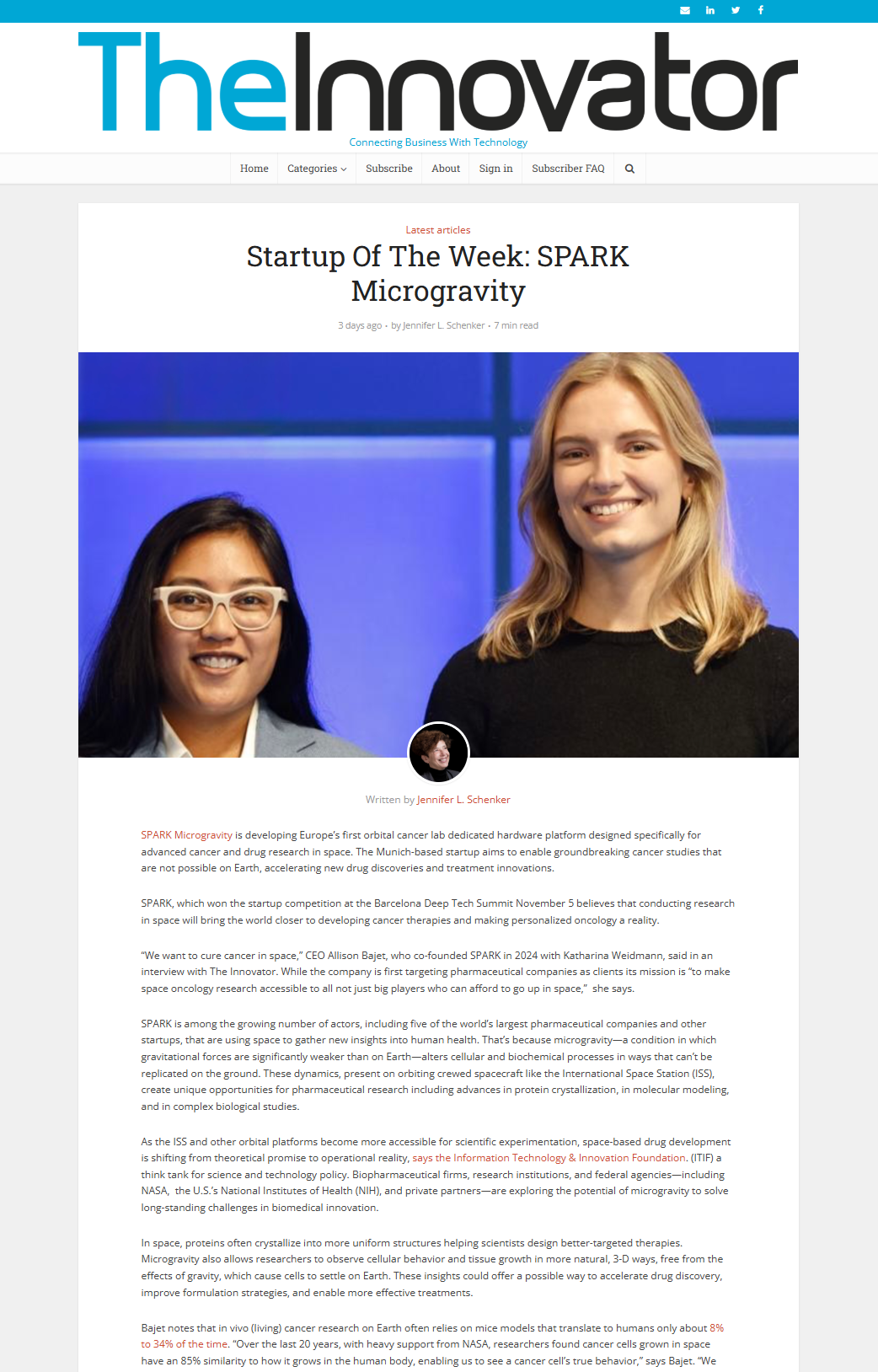
THE INNOVATOR: Startup Of The Week: SPARK Microgravity
Meet the startup who won #1 EU Deep Tech Award 2025

From designing better drugs to creating novel formulations, microgravity offers powerful advantages that can accelerate oncology pipelines and unlock new therapeutic possibilities.
TL;DR: Key Insights for R&D Leaders
In Part 1 of this series, we explored how microgravity allows us to grow more realistic cancer models. The advantages of space also extend to how we design and formulate the drugs themselves. By removing the distortions of gravity, orbital labs are helping scientists overcome fundamental challenges in drug development, leading to more effective and targeted therapies.
A powerful example is protein crystallization, a critical step in modern drug design. To create a targeted therapy, scientists first need a detailed 3D map of their target—often an enzyme driving cancer growth. They achieve this by growing crystals of the protein and analyzing them with X-rays. On Earth, however, gravity interferes with this process, causing imperfections that can obscure important structural details.
In microgravity, proteins can form larger, more perfectly ordered crystals. This higher quality provides a much clearer picture of the protein's atomic structure. For decades, the notorious cancer-driving protein KRAS was considered "undruggable" because its structure was too difficult to map on the ground. On the International Space Station, researchers grew high-quality KRAS crystals that revealed previously unseen binding pockets, renewing hope and guiding the development of drugs that can finally shut it down.
Microgravity doesn't just help us design new drugs; it helps us improve existing ones. Many of today's most effective cancer therapies are complex biologics, like monoclonal antibodies. While powerful, they often must be administered via slow intravenous (IV) infusions because creating a stable, high-concentration formula for a simple injection is incredibly difficult on Earth.
Merck faced this exact challenge with its blockbuster immunotherapy, Keytruda. On Earth, attempts to create a concentrated version resulted in an unstable, viscous solution. In microgravity, however, experiments on the ISS showed that Keytruda could be crystallized into particles of near-perfect uniformity. This breakthrough is a critical step toward developing a subcutaneous injection—a change that would transform the patient experience and deliver massive savings to healthcare systems. For pharmaceutical companies, a new, more convenient formulation can also lead to new patents, extending a drug's market exclusivity and protecting billions in revenue.
The immense potential of space-based drug development has captured the attention of industry leaders. Bristol Myers Squibb, Merck, and other major pharmaceutical companies have already run experiments on the ISS to improve their compounds. Now, a new ecosystem of space biotech startups is emerging to make these advantages accessible to everyone.
Companies like Varda Space Industries are building robotic orbital factories to manufacture pharmaceuticals in space, while others are focused on specific research applications. At the forefront of this movement in Europe is SPARK Microgravity. Our mission is to democratize access to orbital research by providing a turnkey, end-to-end service.
SPARK Microgravity handles everything from experiment design and hardware customization to launch logistics and automated data analysis. We eliminate the complexities of spaceflight, allowing biotech and pharma R&D teams to focus purely on the science. By providing "microgravity-as-a-service," we empower any innovator to leverage the unique environment of space to accelerate their oncology pipeline.
The convergence of falling launch costs and rising automation means that a future of space-enabled healthcare is closer than ever. It is no longer a question of if orbital research can benefit patients, but how quickly we can scale its adoption.
We can now envision a drug development pipeline where microgravity plays a key role at multiple stages. A promising target identified on Earth is crystallized in orbit to guide the design of a highly specific inhibitor. That new drug is then tested against realistic, patient-derived 3D tumor spheroids grown in space to confirm its efficacy. Finally, microgravity is used to perfect a stable, injectable formulation before the drug enters clinical trials. This is the future SPARK Microgravity is building—one where orbital research is a standard, value-driving step in creating the next generation of cancer therapies.
The goal of every oncology innovator is to bring better treatments to patients, faster. Microgravity offers a powerful, proven path to achieving that goal. From designing more targeted drugs to creating more patient-friendly formulations, the orbital environment provides a distinct competitive advantage. SPARK Microgravity is your partner to harness it. We manage the journey to orbit so you can focus on the destination: life-saving breakthroughs.
SPARK Microgravity is a startup dedicated to democratizing space research and making it accessible for researchers across the globe. Headquartered in Munich with operations in the U.S. and Europe, SPARK Microgravity is building Europe’s first orbital cancer research laboratory to accelerate oncology breakthroughs. By providing end-to-end microgravity research services—from experiment design and launch integration to data analysis—SPARK Microgravity enables pharmaceutical companies, biotech startups, and academic teams to leverage the space environment for R&D. Our mission is to advance scientific exploration in low Earth orbit and translate those discoveries into life-saving innovations back on Earth.

Meet the startup who won #1 EU Deep Tech Award 2025

SPARK Microgravity's co-founders share their space research mission during an interview at Barcelona Deep Tech Week 2025.
.svg)